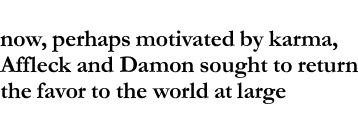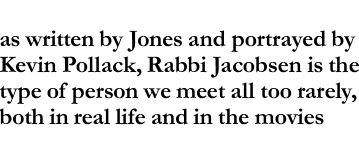I first read about Project Greenlight early in the year 2000, in an Entertainment Weekly sidebar, if I remember correctly. Word started to spread that Ben Affleck and Matt Damon, those local boys who made Good Will Hunting, credited a good deal of their success to the fact that they got a couple of good breaks. Now, perhaps motivated by karma, they sought to return the favor to the world at large. The idea was to hold a screenwriting contest, open to all that hadn’t yet found their big break. The winner would get to direct his/her screenplay as an actual motion picture, produced by Affleck and Damon and distributed by Miramax. The sidebar made the contest sound like it would revolutionize the world of cinema.
The first step was ProjectGreenlight.com, a Web site where people could submit screenplays to the contest or read other people’s submissions. As soon as I learned of the Web site, I visited it, for Project Greenlight—or PGL, as the site abbreviates it—seemed like a dream come true to aspiring filmmakers such as myself. Finally, someone on the inside is willing to give all us poor schlubs a break! My first reaction to the Web site was confusion; apparently, more than Affleck and Damon, the producer taking the most hands-on approach to PGL was some guy named Chris Moore. My second reaction was disappointment; PGL was accepting only feature-length screenplays. It makes sense, of course. If Affleck, Damon, Moore, and Miramax were going to give a screenplay the full professional treatment, they’d want something commercially viable. But all I make is short films. Of course, the possibility PGL presented—a shot at the big time—is considerable motivation to try a feature length screenplay, but I was unhappy with the attempts that resulted. I was trying to force the Muse rather than invite her. Before I knew it, the submission deadline had come and gone.

The contest is now over. It was won by Pete Jones for his screenplay Stolen Summer. Apparently, he had his work cut out for him; according to the Web site, over 10,000 people submitted over 7,000 screenplays, individually or in teams, during the contest’s brief span between September 25 and October 22 in the year 2000. During that time ProjectGreenlight.com grew into the world’s largest online community for people with an interest in filmmaking. Meanwhile, even with the submission stage of the contest over, the selection process continued. The “online community” at ProjectGreenlight.com—including all of the contestants—narrowed the screenplays down to a group of finalists whose screenplays were judged by the executive producers themselves—Affleck, Damon, and Moore. (I have since learned that Moore was the co-producer of Good Will Hunting and producer of American Pie.)
After the Web site and the contest came the HBO documentary miniseries, which, in the words of the PGL Web site, “shows the entire filmmaking process, from the selection of the script, through production and editing, to the film’s theatrical run.” By featuring Jones and Stolen Summer as its models for novice filmmaker and his debut, PGL brings the contest winner another type of exposure: Not only does Jones get to write and direct his own feature for Miramax, he also finds himself the star of his own series.
Now that Stolen Summer has been released to theaters, we finally get to see the result of all this fuss. The movie proper is preceded by a prologue of sorts that gives us a quick review of the purpose and process of Project Greenlight. We begin with producer Matt Damon warning us that being a director is no laughing matter: “The hardest you’ve ever worked? Triple it if you want to work as hard as the director.” Right away, there is a problem. One of the criteria for winning the PGL contest was that your screenplay must have a budget of one million dollars, but right after Damon’s warning, we hear someone complain that “here it is the second day and we’re already saying it’s not going to be one million, but two and a half.” This is followed by some clips from the documentary. The clips, apparently designed to illustrate that all was not sun and daisies for poor Pete Jones, include a lot of moments where various crew members and execs gripe at each other, in segments with such titles as “The Mistakes” and “The Double-Crosses.” We see Jones and others nurse headaches and our envy toward this lucky contest-winner starts to ebb.
Finally, it’s time for the movie itself.
My first thought, even before the opening credits ceased, was that Jones is trying too hard to set the mood. Danny Lux’s happy-childhood-in-suburbia score is at first intrusive; instead of mentally preparing myself for a story to be told, I found myself comparing the music to the work of better-known movie composers. But a story does emerge. The main character is a young Catholic school student named Peter O’Malley. Pete fears that his teacher believes he is on the road to Hell, so Pete decides to redeem himself by converting Jews to Catholicism. He sets up a stand outside the local temple, with a sign that reads “free lemonade and free trips to Heaven.” He fails to find any customers, but he does manage to befriend both the rabbi and his young son, who is just about Pete’s age. Stolen Summer is about these friendships. Pete is too young to properly understand the religious concepts he tries to preach to young Danny Jacobsen, but Pete’s efforts to convert Danny are not in vain, for they are patiently monitored by the rabbi.
Danny and Pete try to follow a priest’s advice by accessing Heaven through a series of tests. Of course, the priest (played by a softly grinning Brian Dennehy) is referring to spiritual tests, but young boys don’t have patience for such things, so their tests instead take the form of an improvised “decathlon” of physical challenges. Every aspect of this quest may be misguided, but the intentions are so pure that our objections are waylaid by the boys’ innocence.

Yet the true poignancy can be found in the other friendship, the one between Pete and the rabbi. Rabbi Jacobsen is the ideal community member and spiritual leader. Charming, kind-hearted, and infinitely patient, the rabbi excels not only in dispensing wisdom but also in finding wisdom in others. When people complain about Pete’s quest to convert Jews, the rabbi quietly explains that by challenging the Jewish religion, Pete is forcing people to think about their spirituality. The best example is the rabbi himself, who, through observing and conversing with Pete, finds new insights into the nature of Judaism, spirituality, and inter-faith relations. As written by Jones and portrayed by Kevin Pollack, Rabbi Jacobsen is the type of person we meet all too rarely, both in real life and in the movies.
His counterpart is Pete’s father, played by Aidan Quinn. Introduced in heroic terms (as a courageous firefighter, no less), Joseph O’Malley is at first quite likable but soon revealed to be an anti-Semitic, bull-headed, hot-tempered blockhead, who rules his family with an iron fist and a quick hand. Joe is featured in his own subplot, as he clashes with Pete’s brother Patrick over Patrick’s ambitions to go to college. Incapable of listening to reason, Joe is so despicable that he is not afraid to dash Patrick’s dreams just to make a point. Joe’s character is the one serious misstep in the story; he is so unlikable that when Jones tries to suddenly make him sympathetic, the character change isn’t growth so much as a complete reversal. The result is just too unbelievable.
Yet Stolen Summer is overall a surprisingly good film. The tone is usually quite pleasant, the subject matter poignant, and both of these qualities find a wonderful personification in the character of Rabbi Jacobsen. I can now see why Stolen Summer is the right Project Greenlight choice. This is not a high concept movie with fists flying or raunchy teenagers. This is the kind of quality film that, were it not for projects like Greenlight, might never get made. So I say this to anyone who complains that there aren’t any good movies out there: It is your responsibility to see Stolen Summer. If you miss the theatrical run, buy or rent the video, and encourage others to do so as well. We need to send the message to Project Greenlight and Hollywood in general that small movies like this can succeed financially if they are done well. By doing so, we can be more assured that whenever someone comes up with a script that combines such intelligence, humor, and warmth, it will be given the green light.
